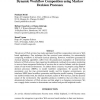Free Online Productivity Tools
i2Speak
i2Symbol
i2OCR
iTex2Img
iWeb2Print
iWeb2Shot
i2Type
iPdf2Split
iPdf2Merge
i2Bopomofo
i2Arabic
i2Style
i2Image
i2PDF
iLatex2Rtf
Sci2ools
134
click to vote
ICWS
2004
IEEE
2004
IEEE
Dynamic Workflow Composition using Markov Decision Processes
The advent of Web services has made automated workflow composition relevant to Web based applications. One technique that has received some attention, for automatically composing workflows is AI-based classical planning. However, workflows generated by classical planning algorithms suffer from the paradoxical assumption of deterministic behavior of Web services, then requiring the additional overhead of execution monitoring to recover from unexpected behavior of services due to service failures, and the dynamic nature of real-world environments. To address these concerns, we propose using Markov decision processes (MDPs), to model workflow composition. To account for the uncertainty over the true environmental model, and for dynamic environments, we interleave MDP-based workflow generation and Bayesian model learning. Consequently, our method models both, the inherent stochastic nature of Web services, and the dynamic nature of the environment. Our algorithm produces workflows that ar...
Related Content
| Added | 31 Oct 2010 |
| Updated | 31 Oct 2010 |
| Type | Conference |
| Year | 2004 |
| Where | ICWS |
| Authors | Prashant Doshi, Richard Goodwin, Rama Akkiraju, Kunal Verma |
Comments (0)

